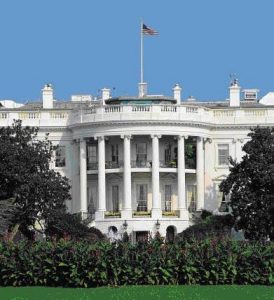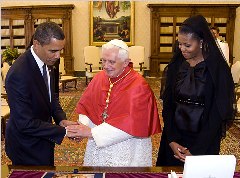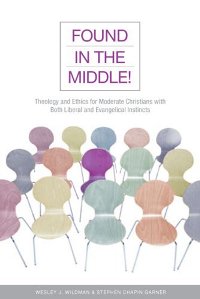Like many of you I had a little extra time this past month. I listened to some new podcasts and radio shows and TV news shows as I shopped for gifts and did some home improvements. What struck me as I encountered nearly a dozen “year end round up” type news programs was the fascination among pundits and analysts with President Obama’s impending “move toward the middle.” The consensus among Conservatives was that Obama, fresh from licking November’s electoral wounds, would attempt a Clintonesque tack toward the right in the hopes of reclaiming momentum among independent voters in time for the 2012 elections. Liberal commentators agreed that such a move was likely and spent considerable time thinking of ways to keep pressure on the Whitehouse from the left. But “the middle” was also a topic that came up over and over as political prognosticators looked toward a 2011 in which GOP Presidential hopefuls will announce their candidacies and establish offices in Iowa, New Hampshire and South Carolina. Yes, they all recognized that the right leaning folks like Huckabee and Palin will garner big headlines, but the serious analysts were perhaps more interested to see which Republican moderates might emerge as candidates and suitors of moderates and independents. In other words, would the GOP field include a candidate who might plausibly fight President Obama for the independent – read non-ideological – voter? Among the gems I (re)discovered over the holidays was KCRW’s “Left, Right and Center.” It’s an interesting show, and noteworthy in part because it doesn’t ignore the possibility that there might be interesting opinions in the Center. In one of their recent shows they discussed the problems of centrist politics and the notion that perhaps the middle is not itself a distinct place but is, rather, simply as a location between the two ideological extremes. The name of the show tells you something about what the panel decided, but it may be worth our time again as Liberal Evangelicals and Moderate Christians to reconsider the question of what it means to be a Moderate. The challenge is that the middle doesn’t seem to offer its own content in politics or doctrine! It seems merely to be a locale identified by what it isn’t. My father-n-law’s culinary specialty is “refrigerator surprise.” He takes all of the leftovers, puts them in one dish and microwaves them – SURPRISE! Of course the dish tastes as bad as it sounds and even if it’s composed of two or more delicious meals, a mere mishmash of these once great tastes is much worse than the sum of their parts. What do moderates offer beyond “refrigerator surprise?” We offer an emphasis on process, dull, often uninspiring process. Let’s get inspired again!
Christians and Americans, not to say American Christians, have an ambivalent relationship with process. On the one hand, we value the democratic process and hold to a system that honors the results of elections and jury trials even when we might very much disagree with the candidates and verdicts these processes elect and produce. The vast majority of the time we acknowledge the basic rightness of compromise and agree to abide by the decision of the majority. Life in a process oriented democracy is messy, the trains might night always run on time and the snow on the roads may not be efficiently removed, but we are reticent to elect a “strong man” to solve these problems for us. On the other hand, we are too often eager to hand our process over to demagogues and fear-mongerers in pulpits and in politics, especially when we feel insecure. In troubled times, process be damned, we want results, certainty, security, authority – and so we elevate those who are willing “to do what it takes to get the job done.” We have a schizophrenic relationship with powerful leaders, we love them and fear them in our churches and our state houses.
I’ll take a shot at characterizing these two attitudes. When we face uncertain times we tend to devalue process and value bold decisive action. In other words, the ends justify the means when the end we crave is security and certainty. But in our more secure and sensible moments – aren’t we all more reflective when we feel safe and loved? – we recognize that the only justification for any end is the means by which it was arrived at. My grade school grammar teachers would be horrified at that last sentence, but the idea is sound. Democracy is about generating “right decisions and legitimate governments” not because Democracy always yields or most efficiently yields the best ends, but because the basic fairness of the process builds consensus and cooperation. The impulse toward local congregational control of church property, staff and doctrine is similarly grounded in a conviction that the manner in which decisions are made is more important than the content of the final decision.
Moderate Middlers (This is why “Left, Right and Center” is having a contest to rename the moderate middle!) value the process of decision making over the decision made, and one of the deep doctrinal commitments of LiberalEvangelical.org is to the notion that part of the Christian witness is showing the world how to live, and work, and worship together with those who are different from us. We demonstrate the profound love of Christ by being a church that builds consensus through the long and torturous process of loving compromise. Love is patient and kind and does not demand its own way – even if it strenuously argues for it in church board meetings! The means justify the end because all humans ends are always provisional and temporary.
When economies fail and external enemies threaten, the middle looks week because it doesn’t have the will “to do what it takes” to fix things or protect us. When cultural norms and comfortable certainties are threatened, Christian moderates seem week because they refuse to engage “full bore” in the culture wars and will not take sides. Too often ideologues of all stripes in denominational boardrooms, in legislatures, and on news shows think only of the ends or goals toward which we as a church or nation ought to aim. Like Christians who focus exclusively on getting to heaven, ideologues who look solely toward an imagined ideal end ignore one of the basic truths of human life: “Life is what happens while you’re making other plans.”
That old chestnut is frequently trotted out as a reminder to us that we should slow down and notice life as it whizzes by lest we wake up at the end of our lives and discover that we’ve arrived but can’t remember the journey. Point taken; but it might also apply to the moderate process-oriented mind set. The path we take in order to arrive at our goal is more important than the goal itself. If the only way to protect our people or culture or church is through scorched earth practices and culture wars, then perhaps our goals aren’t worth pursuing. Moderate Christianity should be practiced with an eye toward making decisions, and coming to consensus even as we recognize that our life and witness is that very practice. It end is so much less relevant.
Here at the beginning of 2011, when so many of us are pursuing goals articulated in the form of New Year’s resolutions, maybe we can voice a more moderate goal. As Liberal Evangelicals and Moderate Christians, let’s commit to ourselves to civil process, let’s make the process itself our goal and allow the means to justify the end. Doesn’t that seem worthy of a headline.



